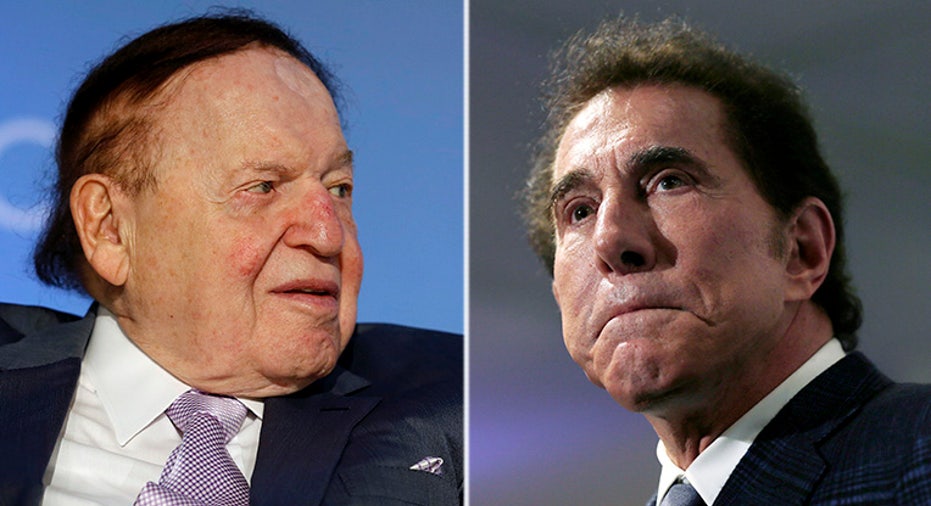Steve Wynn, Sheldon Adelson are GOP midterm fundraising no-shows for now

It wasn’t too long ago that billionaire casino owners Sheldon Adelson and Steve Wynn were regarded as among the Republican Party’s biggest donors, but more recently they have been missing in fundraising action as the GOP faces what appears to be an uphill battle to retain control of House and the Senate in the upcoming midterm elections, FOX Business has learned.
Campaign finance records show that Adelson and Wynn have barely cracked open their wallets for GOP candidates this year. Adelson has contributed a mere $5,000 and only to the Las Vegas Sands PAC, named after the casino he owns, while Wynn has donated just $500,000 this year to the America First Action Super PAC, according to Federal Election Commission records.
Both donations are small compared with their past contributions, and neither man has spent money on an individual candidate this year as of the latest filing date of April 24, records show.
The reason for Wynn’s hiatus is obvious: Three months ago he stepped down from the eponymous casino empire during a sexual harassment scandal. The move prompted a wave of candidates either returning the contributions to him or sending them to various charities. Wynn was forced to resign as finance chairman of the Republican National Committee. Since then, GOP fundraisers have largely avoided Wynn.
The absence of Adelson is more perplexing and troubling to Republicans because he remains a respected figure in the party and someone who was expected to help finance candidates and prevent a possible “blue-wave,” Democratic takeover of the House and possibly the Senate in the upcoming midterms.
He doled out $83 million to Republicans during the 2016 election and was a supporter of Donald Trump’s successful presidential campaign. By contrast, records show he has given just around $138,000 to GOP candidates and committees during the 2017-2018 election cycle, including the $5,000 donation he made to his PAC in January.
Some GOP strategists say that Adelson’s near-absence so far this year indicates that he believes the Republicans could lose control of the House, which polls show is up for grabs, and that his money will be better spent focusing on specific races later in the year so the Republicans can possibly maintain control of the Senate.
“Not having Adelson or Wynn in the game won’t necessarily cost the GOP the House or the Senate,” said a veteran GOP staffer who often raises money for candidates. “But 2018 is a tough year, and we need all the money we can get. Those guys being out of the game hurts.”
A spokesman for Wynn didn’t return telephone calls seeking comment; a spokeswoman for Adelson declined to comment. A spokeswoman for the America First PAC said the organization has no plans to return Wynn’s contribution, which he made in January around the time the sexual harassment charges were first levied. Wynn has in the past maintained his innocence.
A Republican National Committee official who spoke on the condition of anonymity said that while the absence of Adelson and Wynn does hurt fundraising efforts, the RNC continues to set records in terms of donations, pulling in $13.9 million in March alone. The official added that for the 2017-2018 election cycle, records show that the RNC has easily surpassed the Democratic National Committee in terms of raising money.
The official added that the committee believes Adelson will eventually start to open his wallet as the midterms draw near, as he often does. “Sheldon often holds back and gives later in the year,” the official said, adding that a team of fundraisers has helped make up the difference since Wynn’s departure as finance chairman.
“When it came down to it, Wynn wasn’t very big in spending his own money on campaigns,” the official said, pointing to records showing that Wynn’s personal contributions paled in comparison to the multi-million-dollar checks written by Adelson and other big GOP donors, such as Charles and David Koch. Over the years, Wynn was also known to give to Democrats, but in 2016 he largely supported Republicans including President Donald Trump, with whom he has a long and sometimes contentious relationship.
Fundraising officials say the RNC fundraising advantage overstates the party’s ability to hold the House and the Senate in the midterms. That’s because Democratic voter enthusiasm is high, fueled in large part by disgust with Trump’s policies of cutting taxes and less regulation, not to mention the volatile personal demeanor of the president, which has hurt him with independents and led to low favorability ratings.
Meanwhile, the spillover from Trump’s unpopularity has helped the Democrats win some recent House and Senate races, and in individual House contests, Democratic candidates have more than held their own against Republicans in terms of fundraising.
A Politico analysis showed that for the final quarter of 2017, Democratic opponents outpaced more than 40 House Republicans in fundraising. In addition to keeping all the seats they have, Democrats need to flip 24 more to take control of Congress. Republicans hold the Senate by a 51-to-49 seat margin, but given the nature of the races, political consultants say it will be much more difficult for the Senate to switch to Democrat control.
Republican consultant Michael Caputo said “you have to be pretty oblivious not to be concerned about the Republicans losing the House” of Representatives, though he believes the GOP will maintain control of the Senate, given recent poll numbers.
Still, Caputo said there are signs the Republicans may be able to keep the House, citing President Trump’s somewhat improving favorability ratings, which have coincided with a burst of economic growth.
And if that happens, Adelson will start spending, according to Caputo.
“If the economy continues to grow, we have a good chance of keeping the House,” he said, adding, “There are some good signs out there.”



















